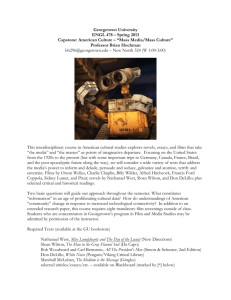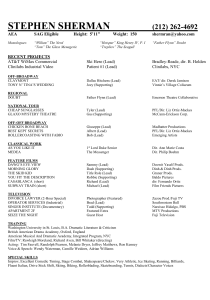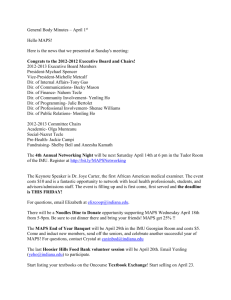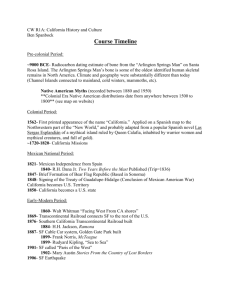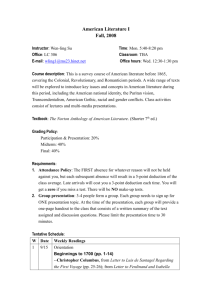Mass Media and the American Mind
advertisement
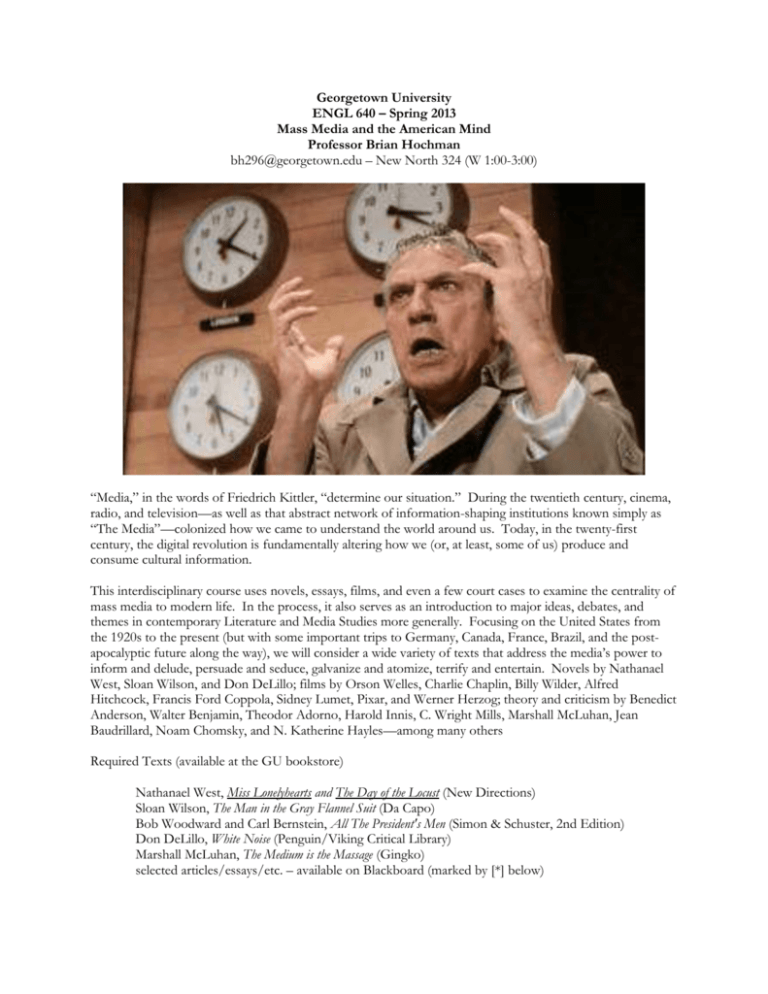
Georgetown University ENGL 640 – Spring 2013 Mass Media and the American Mind Professor Brian Hochman bh296@georgetown.edu – New North 324 (W 1:00-3:00) “Media,” in the words of Friedrich Kittler, “determine our situation.” During the twentieth century, cinema, radio, and television—as well as that abstract network of information-shaping institutions known simply as “The Media”—colonized how we came to understand the world around us. Today, in the twenty-first century, the digital revolution is fundamentally altering how we (or, at least, some of us) produce and consume cultural information. This interdisciplinary course uses novels, essays, films, and even a few court cases to examine the centrality of mass media to modern life. In the process, it also serves as an introduction to major ideas, debates, and themes in contemporary Literature and Media Studies more generally. Focusing on the United States from the 1920s to the present (but with some important trips to Germany, Canada, France, Brazil, and the postapocalyptic future along the way), we will consider a wide variety of texts that address the media’s power to inform and delude, persuade and seduce, galvanize and atomize, terrify and entertain. Novels by Nathanael West, Sloan Wilson, and Don DeLillo; films by Orson Welles, Charlie Chaplin, Billy Wilder, Alfred Hitchcock, Francis Ford Coppola, Sidney Lumet, Pixar, and Werner Herzog; theory and criticism by Benedict Anderson, Walter Benjamin, Theodor Adorno, Harold Innis, C. Wright Mills, Marshall McLuhan, Jean Baudrillard, Noam Chomsky, and N. Katherine Hayles—among many others Required Texts (available at the GU bookstore) Nathanael West, Miss Lonelyhearts and The Day of the Locust (New Directions) Sloan Wilson, The Man in the Gray Flannel Suit (Da Capo) Bob Woodward and Carl Bernstein, All The President's Men (Simon & Schuster, 2nd Edition) Don DeLillo, White Noise (Penguin/Viking Critical Library) Marshall McLuhan, The Medium is the Massage (Gingko) selected articles/essays/etc. – available on Blackboard (marked by [*] below) 2 Class Policies/Requirements Learning Goals: Pitched at the graduate level, this seminar has four main objectives. Over the course of the semester students who take this class should expect . . . 1. to survey theories and fictions of mass media culture in the twentieth and twenty-first centuries, with a special focus on the United States; 2. to gain a broad but disciplined understanding of the major themes, debates, and approaches that are central to the field of Literature and Media Studies in its present configuration; 3. to improve their ability to discern how cultural texts shape, and are shaped by, historical contexts; and 4. to work toward achieving professional levels of writing, research, and critical engagement. Please note: experience in the field of Film and Media Studies is not a prerequisite for this course. However, a cursory knowledge of the basic terms and techniques of visual analysis will likely prove helpful as we move forward. If you feel you need to brush up on the basics, I recommend consulting the handy Yale Film Analysis Web Site (http://classes.yale.edu/film-analysis/), or any edition of David Bordwell and Kristin Thompson’s Film Art: An Introduction. Grading and Requirements: 3 The majority of your grade for this course is determined by a series of assignments due at the end of the semester: a 5-6 page abstract (15%), and a 15-20 page final research paper (50%). The remainder of your grade hinges on a short review essay due in the middle of the semester (15%) and class participation (20%). (The latter category includes regular attendance, thoughtful contribution to class discussion, and your weekly work as “inquisitors,” “synthesizers,” and “seekers of things”—more on these designations below.) Since this course meets just once a week, regular attendance is crucial. Missing more than one or two sessions will seriously jeopardize your participation grade. If you miss more than three, you should reasonably expect to fail the course. General Expectations: 1. Turn in assignments on time. In all cases, late work is not acceptable. My policy is a simple one: for every day an assignment is late, I will deduct 1/3 of a letter grade. I may make exceptions in documented cases of personal or familial hardship (illnesses, family emergencies, etc.). But please take note: the pressures of other exams, papers, or extracurricular activities are not an acceptable excuse for lateness. Plan now to structure your time wisely—and please don’t hesitate to take advantage of my office hours (Wednesdays 1:00-3:00, and by email appointment) to help you work on assignments in advance of their due dates. 2. Attend all film screenings, which take place on Tuesday evenings (6:30-9:00) in the New South Film Studies Screening Room. This is an integral part of our class. The films on our syllabus both require and reward close attention and sustained engagement. With this in mind (and as a courtesy to your fellow classmates), please refrain from using laptops and smartphones in the New South theatre. I highly recommend bringing a notebook with you so that you can take notes during the screening and jot down your reflections immediately following it. If you’d like to refresh your memory before class, DVD copies of the films are available on reserve in the Gelardin New Media Center. (Many are also available on Netflix Instawatch.) 3. Come to class prepared not only to address all of the week’s assigned readings (this means printing them out and bringing them with you!), but to contribute to our conversation in thoughtful and accountable ways. Each week, you will be assigned one of three “roles” to help facilitate class discussion: A. “Inquisitors” are responsible for kicking off class discussion by sharing a film clip or a passage from the readings and raising one or two solid questions about it. This is not a formal presentation. Think “dialogue” rather than “monologue” here. While you should plan to tell the class why you chose your clip/passage and why you think it is interesting, difficult, puzzling, poignant, or meaningful, the more important thing is to come up with some thoughtful questions or points of contention that will help generate discussion. (A helpful hint on this front: honest questions lead to honest responses.) Whatever you do, you must let me know, via email, what clip or passage you want to share by 5:00 PM on the Monday before class. B. “Seekers of Things” are responsible for bringing to class something from outside of the syllabus that substantively adds to or resonates with the texts under consideration—an article, an image, a media file, a youtube clip, whatever. Plan on bringing your thing up at some point during class discussion. C. “Synthesizers” will write one- or two-sentence summaries of the secondary readings for a given week (listed below under “contexts” and “critique”). These should attempt to capture the main thrust of each piece under consideration, but they cannot be longer than one or two sentences. Email your summaries to me by 10:00 AM on the day of our class meeting. I will then compile and distribute them for everyone to see. If you aren’t designated to be an Inquisitor or a Seeker of Things for a given session, your job is to be a Synthesizer. 4 I’ll assign dates for your roles in class once enrollment settles. Please take note that class dynamics will vary from session to session, following people’s particular interests and energies. Inquisitors and Seekers of Things: don’t be discouraged if you prepare something wonderful and we end up going off in another direction entirely. This is part of the teaching process; it happens to me all of the time. Far better to have a productive and energetic class discussion than to stick to a plan. More often than not, the unexpected is a good thing! Writing Assignments: 1. Review Essay: Your first writing assignment (due Monday, March 25) is to compose a 3-4 page review essay that considers one of three recent monographs in the field of media theory/media history: Jussi Parikka’s Insect Media (University of Minnesota Press, 2010), Hanna Rose Shell’s Hide and Seek: Camouflage, Photography, and the Media of Reconnaissance (MIT/Zone Press, 2012), or Jonathan Sterne’s MP3: The Meaning of a Format (Duke University Press, 2012). The review essay is an important genre of academic writing. To get a sense of its conventions, I recommend taking a look at a few examples in a major academic journal (c.f., Project Muse or JSTOR). In short, review essays of this length typically follow a tripartite structure: 1) summary of the book’s main points/arguments; 2) detailed outline of the book’s main case studies; 3) evaluation of the book’s significance, scholarly appeal, etc. Students are responsible for obtaining their own copy of the book they choose to review. 2. Abstract/Final Paper: Your work for this course will culminate in a paper (due Monday, May 8) that can take one of two forms: 1) a 15-20 page critical essay that examines one or two of the primary texts on our syllabus, or 2) a 15-20 page historiographical review essay that addresses a theme or problem in the field of Literature and Media Studies, broadly defined. In either case, you are expected to consult a number of secondary sources in order to help frame and advance your argument, and you must produce a 5-6 page abstract of your paper topic (due Monday, April 22) before getting started. I’ll say more about the expectations for the abstract and the final paper as the semester progresses. I’ll also be happy to discuss potential ideas and approaches during office hours (W 1-3, New North 324). Plagiarism and Academic Honesty: The Georgetown University Honor Code—which includes a detailed definition of plagiarism—can be found on the GU website at http://gervaseprograms.georgetown.edu/honor/system/53377.html. In short: Plagiarism is the act of passing off as one’s own the ideas or writings of another. While different academic disciplines have different modes for attributing credit, all recognize and value the contributions of individuals to the general corpus of knowledge and expertise. Students are responsible for educating themselves as to the proper mode of attributing credit in any course or field….[T]hree simple conventions are presented for when you must provide a reference: 1) If you use someone else's ideas, you should cite the source; 2) If the way in which you are using the source is unclear, make it clear; 3) If you received specific help from someone in writing the paper, acknowledge it….Faculty may use various methods to assess the originality of students' work. For example, faculty may submit a student's work to electronic search engines, including turnitin.com, a service to which the Honor Council and the Provost subscribe. Note that plagiarism can be said to have occurred without any affirmative showing that a student’s use of another’s work was intentional. I follow Georgetown’s guidelines for plagiarism. I also submit all student work to turnitin.com, an electronic search engine that detects instances of plagiarized writing. If you have any uncertainty about the meaning of plagiarism, please be sure to discuss it with me. 5 6 Schedule of Readings/Screenings/Assignments (subject to change in the course of the semester, if necessary) Jan. 15 Course Introduction 6:30-9:00 Screening: Citizen Kane (1941), dir. Orson Welles Jan. 22 The “Invention” of the Media text: Citizen Kane (1941), dir. Orson Welles context: Edward Sapir, “Communication” (1931) [*] Harold Innis, Empire and Communications (1950), 21-31 [*] Harold Innis, The Bias of Communication (1951), 33-60, 156-189 [*] critique: Raymond Williams, Keywords, 72-73, 203-204 [*] Benedict Anderson, Imagined Communities, 1-46 [*] James Naremore, “The Magician and the Mass Media” [*] 7 6:30-9:00 Screening: Triumph of the Will (1935, selections), dir. Leni Reifenstahl; The Great Dictator (1940), dir. Charles Chaplin Jan. 29 Media, Masses, Propaganda text: Triumph of the Will (1935), dir. Leni Riefenstahl The Great Dictator (1940), dir. Charles Chaplin context: Edward Bernays, Propaganda (1928), 1-61, 92-114 [*] Walter Benjamin, “The Work of Art in the Age of Mechanical Reproduction” (1936) [*] Lee and Lee, “The Fine Art of Propaganda” (1939) [*] critique: Frank Scheide, “The Great Dictator and Chaplin’s Tramp” [*] Feb. 5 Adventures in the Culture Industry: Hollywood (I) text: Nathanael West, The Day of the Locust (1939) 6:30-9:00 Screening: Sunset Boulevard (1950), dir. Billy Wilder Feb. 12 Adventures in the Culture Industry: Hollywood (II) text: Sunset Boulevard (1950), dir. Billy Wilder context: Siegfried Kracauer, “The Mass Ornament” (1927) [*] Theodor Adorno and Max Horkheimer, “The Culture Industry” (1944) [*] André Bazin, “The Ontology of the Photographic Image” (1945), “The Myth of Total Cinema” (1946) [*] Hortense Powdermaker, “Emerging from Magic” (1950) [*] critique: Morris Dickstein, “Sunset Boulevard” [*] 8 Feb. 19 Conformity, Consumption, and Mass Society text: Sloan Wilson, The Man in the Gray Flannel Suit (1955) context: Lazarsfeld and Merton. “Mass Communication, Popular Taste, and Social Action” (1948) [*] Katz and Lazarsfeld, “Between Media and Mass” (1955) [*] C. Wright Mills, “The Mass Society” (1956) [*] 6:30-9:00 Screening: The Manchurian Candidate (1962), dir. John Frankenheimer Feb. 26 The Extensions of Man text: The Manchurian Candidate (1962), dir. John Frankenheimer context: Marshall McLuhan, Understanding Media (1964), 3-32, 297-337 [*] Marshall McLuhan, The Medium is the Massage (1967) critique: Matthew Jacobson and Gaspar Gonzalez, What Have They Built You to Do?, 30-51 [*] Mar. 12 Watchdogs and Whistleblowers text: Bob Woodward and Carl Bernstein, All The President's Men (1974) context: New York Times Co. v. United States (1971) [*] 6:30-9:00 Screening: The Conversation (1974), dir. Francis Ford Coppola Mar. 19 Sound and Sense text: The Conversation (1974), dir. Francis Ford Coppola 9 context: R. Murray Shafer, The Soundscape (1977), 3-12, 88-99 [*] Michel Chion, The Voice in Cinema (1982), 1-29 [*] Friedrich Kittler, Gramophone, Film, Typewriter (1986), 1-101 [*] critique: Dennis Turner, “The Subject of the Conversation” [*] 6:30-9:00 Screening: Vertigo (1958), dir. Alfred Hitchcock Mar. 25 3-4 PAGE REVIEW ESSAY DUE 5:00-6:30 Lecture: Laura Mulvey, “Hitchcock’s Blondes” Mar. 26 Special Case Study: Alfred Hitchcock text: Vertigo (1958), dir. Alfred Hitchcock critique: Laura Mulvey, “Visual Pleasure and Narrative Cinema” (1975) [*] Tania Modleski, The Women Who Knew Too Much, 1-16, 87-100 [*] 6:30-9:00 Screening: Network (1976), dir. Sidney Lumet Apr. 2 Box Populi (I) text: Network (1976), dir. Sidney Lumet context: Raymond Williams, Television (1974), 1-25, 121-138 [*] Jean Baudrillard, Simulacra and Simulation (1981), 1-42 [*] Neil Postman, Amusing Ourselves to Death (1985), 1-29, 83-113, 142-154 [*] Herman and Chomsky, Manufacturing Consent (1988), 1-86, 297-308, xi-xix [*] Apr. 9 Box Populi (II) text: Don DeLillo, White Noise (1985) 10 context: David Foster Wallace, “E Unibus Pluram” (1993) [*] 6:30-9:00 Screening: Wall-E (2008), dir. Andrew Stanton Apr. 16 “New” Media text: Wall-E (2008), dir. Andrew Stanton context: Jay David Bolter and Richard Grusin, Remediation (1999), 2-50 [*] Lev Manovich, The Language of New Media (2001), 19-61 [*] Alan Liu, “Transcendental Data” (2004), 49-84 [*] D.N. Rodowick, The Virtual Life of Film (2007), 1-31 [*] critique: Vivian Sobchack, “Animation and Automation” [*] 6:30-9:00 Screening: Cave of Forgotten Dreams (2011), dir. Werner Herzog Apr. 22 5-6 PAGE ABSTRACT DUE Apr. 23 Course Wrap-Up: Media Archaeologies Cave of Forgotten Dreams (2011), dir. Werner Herzog May 8 15-20 PAGE FINAL PAPER DUE
